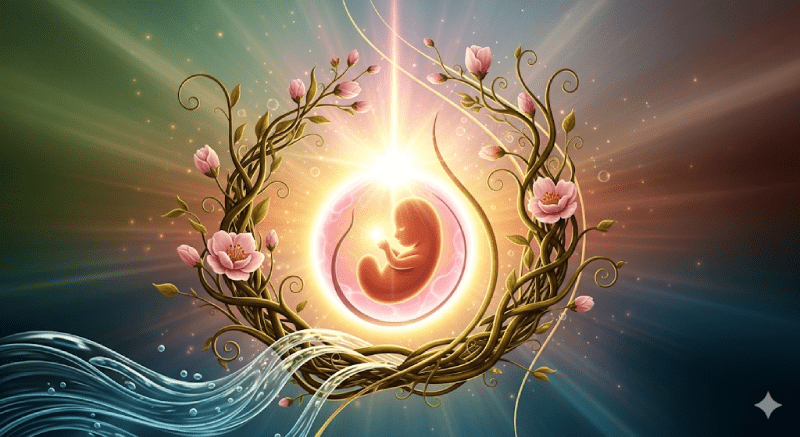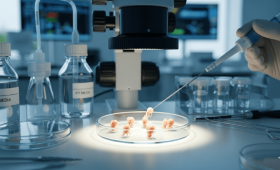How Many Times Can IVF Treatment Be Attempted?
There is no definitive upper limit for the number of IVF treatment attempts. However, each attempt is evaluated based on the couple’s physical and emotional state, age, infertility cause, and response to treatment. Generally, if a successful result is not obtained after the first three attempts, different approaches or additional tests may be recommended for the treatment. Since couples are often emotionally and financially strained, it is of great importance to get support from specialists and shape the treatment plan accordingly during this process.
What Are The Success Rates in IVF Treatment?
The success rate of IVF treatment varies depending on many factors. The most important factors include the woman’s age, egg quality, sperm quality, and the cause of infertility. While success rates are higher in women under 35, this rate may decrease in women aged 40 and over. Generally, the success rate per attempt can vary between 20% and 40%, but this does not affect your total chance of pregnancy. Each attempt is a new chance in itself.
What Should Be Done After An Unsuccessful IVF Attempt?
After an unsuccessful IVF attempt, couples primarily need emotional rest. It is important to meet with specialists to perform an analysis of why the treatment failed. Reasons such as embryo quality, uterine lining thickness, hormonal levels, or genetic factors should be examined. Changes in the treatment protocol or additional tests (for example, preimplantation genetic screening) can be recommended to increase the chance of success in the next attempt.
Is It Necessary To Take A Break In IVF Treatment?
After an unsuccessful attempt, taking a break to rest physically and psychologically is generally recommended instead of starting a new attempt immediately. This break allows the body to clear out hormones and the ovaries to rest, providing time to recover emotionally. It is important that the couple feels ready before starting treatment again. Planning a trip with an organization like Cure Holiday can be beneficial for resting during this process.
What Is The Importance Of Age During IVF Treatment?
The woman’s age is one of the factors that most affects the success rate of IVF treatment. As age progresses, egg reserve and egg quality decrease. This situation both lowers pregnancy rates and increases the risk of embryos with chromosomal abnormalities. While success rates begin to decrease after age 35, a significant decrease is observed after age 40. Therefore, it is important that the treatment plan is made as soon as possible, considering the age factor.
How Many Times Is It Sensible To Try IVF Treatment?
How many times it is sensible to try IVF treatment is a completely personal decision. Factors such as financial situation, emotional resilience, physical health, and age influence this decision. Generally, couples may decide to stop at some point between 3 and 6 attempts. After a failure, it can be beneficial to talk to specialists and evaluate alternative treatment options (for example, egg donation).
What Tests Are Done Before Trying IVF Treatment Again?
Before starting another IVF attempt, a comprehensive evaluation is conducted to understand why the first treatment failed. This evaluation may include additional tests such as preimplantation genetic screening (PGT) to examine embryo quality, hysteroscopy to evaluate the inside of the uterus, or immune system tests. These tests help create a personalized treatment plan to increase the chance of success in the next attempt.

What Is The Advantage Of Frozen Embryos In IVF Treatment?
Frozen embryos allow for multiple attempts to be carried out more affordably and with less physical stress. Healthy embryos remaining after a successful fresh cycle can be frozen. If the first attempt fails, there is no need to perform an egg retrieval procedure again for the next attempt. This makes the treatment process more comfortable and economical.
In Which Situations Is The Number Of IVF Attempts Limited?
The number of IVF treatment attempts can be limited due to health conditions or financial reasons. Some hormonal disorders or uterine problems can make it difficult to continue treatment. In addition, the high cost of each attempt can be a limiting factor for many couples. It is important to consider these situations before starting treatment.
Why Does IVF Treatment Fail?
There can be many reasons for the failure of IVF treatment. The most common reasons include poor embryo quality, problems during embryo transfer, an unsuitable uterine lining, or genetic factors. Hormonal problems, immune system reactions, and lifestyle factors can also increase the risk of failure. A comprehensive evaluation from a specialist helps determine the cause of the failure.
When Should A Decision To Stop IVF Treatment Be Made?
When to stop IVF treatment is a personal decision for the couple. When making this decision, the time, energy, and financial resources spent are considered. Generally, if it is believed that the chance of success is very low after a certain number of attempts or if the couples are emotionally exhausted, a decision to stop may be made. When making this decision, other alternatives (for example, adoption) can also be considered.
What Are The Reasons For Repeated IVF Failures?
The reasons behind repeated IVF failures can be complex. These reasons can include genetic factors (chromosomal abnormalities in the embryo), uterine problems (polyps, fibroids, or adhesions), immune system reactions, and endocrine disorders. In these situations, more advanced diagnostic tests (PGT, hysteroscopy, immunological tests) and personalized treatment protocols may be necessary.
Does Frozen Embryo Transfer Affect The Success Rate?
Yes, frozen embryo transfer can have higher success rates than fresh transfer in some cases. The freezing and thawing processes only allow healthy and high-quality embryos to survive. In addition, during the cycle in which the transfer is performed, the uterine environment is at more natural hormonal levels, which can create a more suitable environment for implantation.
How Does Taking A Break In Treatment Affect Physical Health?
Taking a break from treatment after an unsuccessful IVF attempt allows the body to clear out hormones and the ovaries to rest. This provides a healthier start for the next attempt. The body’s healing and the re-establishment of hormonal balance can help lead to a more positive response to the next treatment. Spending this period resting can physically strengthen the body.
What Is The Importance Of Nutrition In IVF Treatment?
A healthy diet during IVF treatment can directly affect treatment success. A diet rich in antioxidants, Omega-3 fatty acids, and folic acid improves both egg and sperm quality. Staying away from processed foods, excessive sugar, and caffeine helps maintain hormonal balance and supports overall body health.
Why Is Stress Management Necessary In IVF Treatment?
The IVF process can be physically and emotionally very stressful. High stress levels can lead to hormonal imbalance, negatively affecting the success of the treatment. Therefore, methods such as meditation, yoga, regular exercise, and finding hobbies should be used for stress management. Partner support is also very important during this process.
What Is The Effect Of Medication Use On IVF Success?
Hormonal medications used in IVF treatment are of vital importance for supporting egg development and uterine preparation. However, the medications can also have side effects. A personalized medication protocol is determined according to each couple’s specific situation to increase the success rate. The correct use of medications is a critical factor for the treatment to be successful.
What Are The Psychological Effects Of Repeated Treatments?
Repeated unsuccessful IVF attempts can create intense psychological pressure on couples. Feelings such as hopelessness, disappointment, anxiety, and depression are frequently experienced. It is very important to get professional psychological support and support each other as a couple during this process.
Are There Other Options In IVF Treatment?
Other options can also be evaluated after unsuccessful IVF attempts. These options may include egg donation, sperm donation, or embryo donation. These alternatives can help couples realize their dreams of parenthood.
Is High-Priced IVF Treatment More Successful?
The price of IVF treatment does not directly determine the success rate. A center being high-priced may mean it has more advanced technologies or a more experienced team, but this does not guarantee personal success. Before starting treatment, the success rates of the centers, the technologies used, and the experiences of previous patients should be researched.
What Are The Side Effects Of IVF Treatment?
Common side effects of IVF treatment include abdominal bloating, headaches, nausea, emotional fluctuations, and pain at the injection site. These side effects are usually temporary and disappear after the treatment is over. A more serious but rare side effect is ovarian hyperstimulation syndrome (OHSS).
What Is The Relationship Between IVF Treatment And Obesity?
Obesity can lower the success rates of IVF treatment. Excessive weight can lead to hormonal imbalance, a decrease in egg quality, and implantation problems. Reaching a healthy weight before starting treatment is an important step to increase the chance of success.
How Many Times Can Frozen Embryo Transfer Be Done?
Frozen embryo transfer involves less physical stress than fresh transfer and generally offers more chances for an attempt. The number and quality of frozen embryos determine the number of attempts. Trying again with frozen embryos after an unsuccessful attempt is more economical, and the body does not need to go through a new treatment cycle.
How Does Smoking And Alcohol Consumption Affect IVF Treatment?
Smoking and alcohol consumption seriously lower the success rate of IVF treatment. Smoking negatively affects egg and sperm quality, while alcohol can disrupt hormone levels and reduce the chance of pregnancy. It is necessary to completely quit these substances before starting treatment.
What Is The Importance Of Lifestyle Changes In IVF Treatment?
A healthy lifestyle is of critical importance for increasing the success of IVF treatment. Regular exercise, balanced nutrition, sufficient sleep, and avoiding stress help the body respond better to treatment.
What Are The Nutrition Tips For Success In IVF Treatment?
To increase the chance of success during IVF treatment, foods rich in plenty of fresh fruits and vegetables, whole grains, healthy fats, and protein should be consumed. Staying away from fast food and processed foods helps maintain hormonal balance.
Can I Exercise During IVF Treatment?
Yes, light-paced exercises (walking, yoga) can be done during IVF treatment. Overly strenuous and tiring sports are not recommended as they can disrupt hormonal balance. Regular exercise increases blood circulation, supporting uterine and ovarian health.

In Which Attempt Is IVF Treatment Successful?
In which attempt IVF treatment will be successful varies from person to person. There are couples who are successful on the first attempt, as well as couples who achieve success after a few attempts. The important thing is not to give up, to be patient, and to review the treatment plan with specialists.
How To Get Family Support During IVF Treatment?
Family and friend support is very important during this difficult process. Talking to them to relax emotionally and sharing your experiences is beneficial. Managing family members’ expectations and openly sharing the process with them can also reduce tension.
How To Overcome IVF Treatment Failure?
Disappointment and sadness after a failure are normal. Allow yourself time to mourn. Joining support groups, getting counseling, or going on a vacation (for example with Cure Holiday) can improve your mental health. The important thing is not to let these emotions hold you captive for a long time.
When Is The Pregnancy Test Done In IVF Treatment?
The pregnancy test after IVF treatment is done approximately 12-14 days after the embryo transfer. This test measures the hCG hormone level in the blood to definitively determine whether there is a pregnancy. This two-week waiting period is one of the most stressful periods for couples.
Which Vitamins Should Be Used In IVF Treatment?
In IVF treatment, supplements such as folic acid, vitamin D, vitamin E, vitamin C, and coenzyme Q10 may be recommended. These vitamins improve egg and sperm quality. However, it is important to consult a specialist before using any supplements.
How Does Embryo Quality Affect IVF Success?
Embryo quality is one of the most important determinants of IVF treatment. Genetically healthy and morphologically well-developed embryos have a higher chance of implanting in the uterus and continuing a healthy pregnancy. Embryo quality depends on factors such as laboratory conditions and sperm and egg quality.
What Situations Increase The Chance Of Success In IVF Treatment?
Factors that increase the chance of success in IVF treatment include the woman’s young age, healthy sperm and eggs, a healthy uterine environment, the use of frozen embryos, and a personalized treatment protocol. A healthy lifestyle and stress management also contribute to success.
Why Is Abroad Preferred For IVF Treatment?
IVF treatment abroad can be more affordable or have more flexible legal regulations in some countries. Some couples prefer to go abroad to access advanced technologies or specialists that they cannot find in their own country. This can be a new hope, especially for couples who have experienced repeated failures.



